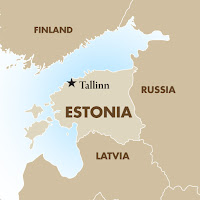I have been hearing and reading for years about the growing necessity for professionals to attend to their online presence. I have also, other than a couple of dippings of my toes in the online water, run from that necessity. Technology is scary to me. I feel like a fish out of water when I attempt to work with it. The online world feels big and scary and overwhelming, so I avoid. (Not an effective strategy for someone who is working on a PhD and moving toward a profession in academia!)
After reading an article for the Web 2.0 class that I am taking at FSU titled
Creating an Intentional Web Presence: Strategies for Every Educational Technology Professional by Lownthal, Dunlap, and Stitson, I realize that running is no longer an option. The authors, convincingly, discuss the vital importance of taking control over one's online personality and footprint. As I read, a picture began to form in my mind of my future possible employers sitting at a computer, typing my name into Google, and yielding nothing but my Facebook page and other social media silliness. Ugh! I do not like that picture! Thankfully, the authors include specific guidelines for how to go about attending to online presence.
The first is to create a personally controlled website. No problem. Though I think I have pretty much decided to get some help doing it--actually hiring someone who really knows what they're doing and create something for me, though something simple, that is beyond just a canned template. I like the idea of having this, as the authors call it, "home base."
Second, the authors encourage actively engaging in social networking. Networking goes beyond just posting fun personal stuff on social media. Networking is about making connections with key individuals and online communities that can provide professional support. I am just getting going on this, but it is one of those things that I feel like I have to just start doing and then learn as I go. I'm getting more active on Twitter, and being more careful about the types of things I post on Facebook--attempting to add in posts of a more professional interest and limit posts that have to do with my political leanings and such.
Third, the authors talk about the importance of contributing and sharing professional resources connected with your area of expertise. Not only is it important to share your own work, but it is important to also curate and share the work of others that you find useful and that you think might be useful to others in your field. I have tried to do a little bit of this with YouTube (
School Counseling and Guidance Resources) but have pretty much decided, again, that I am going to get some professional support. I have also become quite intrigued with the idea of using SlideShare, as I have several Power Point presentations I have created for trainings, conferences, and presentations that could be useful to others in my field. Gonna try that one next. One step at a time . . .
Fourth, and last, the authors discuss Search Engine Optimization (SEO). Yikes! What?! Definitely getting some professional support here. This is something I have heard about and read about, and have absolutely no clue about. At the same time, I don't want to miss this apparently very-important boat in the Web 2.0 ocean.
Whew! Lots to think about. Lots to consider. Lots to learn. Exciting and scary at the same time.
I'm going to go have a glass of wine now . . .
Cheers!
 For the first month that he is there, he is not allowed to have any contact with his friends and family back home. That's right folks. My son is going away to a foreign country (albeit a wonderful and safe one), and I am not going to be able to hear from him for a month. I mean, I get it. They want him to acclimate. They want him to learn to depend on his host parents. But . . . dang.
For the first month that he is there, he is not allowed to have any contact with his friends and family back home. That's right folks. My son is going away to a foreign country (albeit a wonderful and safe one), and I am not going to be able to hear from him for a month. I mean, I get it. They want him to acclimate. They want him to learn to depend on his host parents. But . . . dang.
















